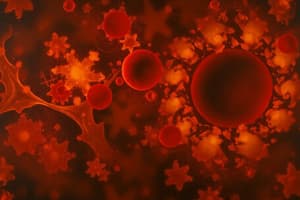Podcast
Questions and Answers
What role does ATP play in cellular processes?
What role does ATP play in cellular processes?
- It serves as an energy carrier molecule (correct)
- It stores genetic information
- It acts as a structural component of cells
- It functions as a receptor for nutrients
Which of the following pathways is NOT typically involved in cellular respiration?
Which of the following pathways is NOT typically involved in cellular respiration?
- Electron transport chain
- Krebs cycle
- Glycolysis
- Calvin cycle (correct)
What characterizes catabolic reactions in metabolism?
What characterizes catabolic reactions in metabolism?
- They synthesize larger molecules from smaller ones
- They mainly occur in the cytoplasm
- They break down molecules to release energy (correct)
- They involve the consumption of energy
How can metabolic pathways be regulated?
How can metabolic pathways be regulated?
Which statement best describes the nature of biochemical pathways?
Which statement best describes the nature of biochemical pathways?
What is the correct order of the pathways involved in cellular respiration?
What is the correct order of the pathways involved in cellular respiration?
Where does glycolysis occur within the cell?
Where does glycolysis occur within the cell?
What is the primary output of the Citric Acid Cycle?
What is the primary output of the Citric Acid Cycle?
What molecule is formed when acetyl-CoA combines with oxaloacetate?
What molecule is formed when acetyl-CoA combines with oxaloacetate?
Which type of phosphorylation occurs during glycolysis and the Citric Acid Cycle?
Which type of phosphorylation occurs during glycolysis and the Citric Acid Cycle?
What role does Acetyl CoA play in cellular respiration?
What role does Acetyl CoA play in cellular respiration?
Which of the following is NOT a product generated by the citric acid cycle?
Which of the following is NOT a product generated by the citric acid cycle?
Where does the citric acid cycle take place within the cell?
Where does the citric acid cycle take place within the cell?
Which step follows the oxidation of the remaining 2C fragment in the process leading to acetyl-CoA formation?
Which step follows the oxidation of the remaining 2C fragment in the process leading to acetyl-CoA formation?
What are the two main processes involved in oxidative phosphorylation?
What are the two main processes involved in oxidative phosphorylation?
What is a key way to regulate a metabolic pathway?
What is a key way to regulate a metabolic pathway?
How do allosteric enzymes regulate metabolic pathways?
How do allosteric enzymes regulate metabolic pathways?
Which of the following substances can inhibit the enzyme phosphofructokinase (PFK)?
Which of the following substances can inhibit the enzyme phosphofructokinase (PFK)?
What role does G6P play in the regulation of the enzyme hexokinase?
What role does G6P play in the regulation of the enzyme hexokinase?
What is the primary purpose of feedback regulation in cellular respiration?
What is the primary purpose of feedback regulation in cellular respiration?
Which metabolic process is primarily regulated through feedback inhibition?
Which metabolic process is primarily regulated through feedback inhibition?
Why is it important for opposing pathways not to run simultaneously in a cell?
Why is it important for opposing pathways not to run simultaneously in a cell?
Which factor enhances the activity of phosphofructokinase (PFK)?
Which factor enhances the activity of phosphofructokinase (PFK)?
What term best describes the process of breaking down large molecules into smaller ones?
What term best describes the process of breaking down large molecules into smaller ones?
Which statement is true regarding anabolic pathways?
Which statement is true regarding anabolic pathways?
Which of the following statements about ATP is incorrect?
Which of the following statements about ATP is incorrect?
What is the primary metabolic fuel that carbohydrates break down into?
What is the primary metabolic fuel that carbohydrates break down into?
What is the role of NAD+ in fermentation?
What is the role of NAD+ in fermentation?
What are the end products of the complete oxidation of one glucose molecule?
What are the end products of the complete oxidation of one glucose molecule?
In which condition does pyruvate undergo fermentation?
In which condition does pyruvate undergo fermentation?
What is the primary function of glycolysis in cellular respiration?
What is the primary function of glycolysis in cellular respiration?
What type of reaction occurs when ATP is synthesized from ADP?
What type of reaction occurs when ATP is synthesized from ADP?
Which process is primarily responsible for generating bioethanol from starch?
Which process is primarily responsible for generating bioethanol from starch?
Flashcards are hidden until you start studying
Study Notes
Energy Flow in Living Systems
- Energy enters ecosystems as sunlight, captured by photosynthesis to create organic molecules like starch and sugar.
- Cellular respiration breaks down these molecules, releasing energy to generate ATP, the cell's main energy currency.
- Some energy is lost as heat.
- Glucose is the primary metabolic fuel, completely oxidized to yield a large amount of ATP.
- In the absence of oxygen, pyruvate enters fermentation, regenerating NAD+ for continued glycolysis and producing 2 ATPs.
Cellular Respiration Pathways
- Four pathways are involved: Glycolysis, Pyruvate Oxidation, Citric Acid Cycle, and Oxidative Phosphorylation.
- Glycolysis occurs in the cytosol, converting glucose to pyruvate. It yields a small amount of ATP.
- Pyruvate oxidation, occurring in the mitochondrial matrix, converts pyruvate to Acetyl-CoA, releasing CO2 and generating NADH.
- The Citric Acid Cycle (Krebs cycle or TCA cycle), also in the mitochondrial matrix, further oxidizes Acetyl-CoA, producing CO2, ATP, NADH, and FADH2.
- Oxidative phosphorylation, in the inner mitochondrial membrane, uses the electron transport chain and chemiosmosis to generate a large amount of ATP from NADH and FADH2. Oxygen is the final electron acceptor.
Regulation of Metabolic Pathways
- Metabolic pathways are regulated to ensure efficient energy production and avoid waste.
- Two main mechanisms: end-product inhibition (negative feedback) and enzyme synthesis regulation.
- End-product inhibition involves the end-product slowing down or blocking the pathway by inhibiting an earlier enzyme.
- Enzyme synthesis regulation controls the amount of enzymes produced.
- Allosteric enzymes respond to inhibitors and activators, adjusting the pathway's pace (e.g., phosphofructokinase in glycolysis).
- Feedback regulation in cellular respiration adjusts the rate based on the cell's needs.
Other Metabolic Pathways
- Glycolysis's first step (hexokinase) is regulated by its end-product G6P, which acts as a competitive inhibitor.
Studying That Suits You
Use AI to generate personalized quizzes and flashcards to suit your learning preferences.




